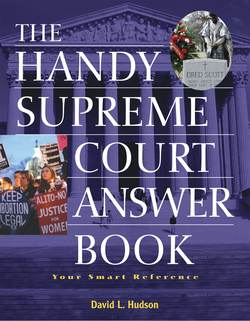Читать книгу The Handy Supreme Court Answer Book - David L Hudson - Страница 274
На сайте Литреса книга снята с продажи.
What happened to Vallandigham after his banishment to the South?
ОглавлениеThe Confederates treated him well; he wound up in Bermuda, then sailed to Canada. Having been nominated in July 1863 for governor of Ohio, he ran in absentia but lost. He returned to Ohio in 1864 where many cheered him as a hero. Not wanting to create a martyr, Lincoln ignored him and did not arrest him. Vallandigham also ran unsuccessfully for the U.S. Senate in 1869 and then had great success as a trial lawyer. Unfortunately, as an attorney for the defendant in a murder trial, Vallandigham accidentally shot himself to death while demonstrating how the victim had been shot.
CourtSpeak: The Prize Cases (1863)
Justice Robert Grier (majority): “This greatest of civil wars was not gradually developed by popular commotion, tumultuous assemblies, or local unorganized insurrections. However long may have been its previous conception, it nevertheless sprung forth suddenly from the parent brain, a Minerva in the full panoply of war. The President was bound to meet it in the shape it presented itself, without waiting for Congress to baptize it with a name; and no name given to it by him or them could change the fact.”
Justice Samuel Nelson (dissenting): “Now, in one sense, no doubt this is war, and may be a war of the most extensive and threatening dimensions and effects, but it is a statement simply of its existence in a material sense, and has no relevancy or weight when the question is what constitutes war in a legal sense, in the sense of the law of nations, and of the Constitution of the United States? For it must be a war in this sense to attach to it all the consequences that belong to belligerent rights….
“Congress alone can determine whether war exists or should be declared; and until they have acted, no citizen of the State can be punished in his person or property, unless he has committed some offence against a law of Congress passed before the act was committed, which made it a crime, and defined the punishment. The penalty of confiscation for the acts of others with which he had no concern cannot lawfully be inflicted.”
